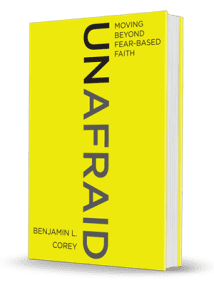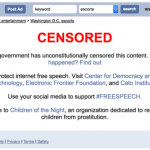
The cause of fighting human trafficking has been a hot topic for a few years now, and rightfully so. I’m one who has been so passionate about the issue that I did four years of doctoral work on the topic, from the brothels of India to all the major geographic regions of the United States– ultimately earning Fuller Theological Seminary’s 2016 Missiology Award for what was deemed unique and noteworthy contributions to the field and study of human trafficking.
There’s a lot in this world I don’t know, but I know a couple of things about human trafficking.
While awareness around human trafficking has grown exponentially in recent years, a dangerous thing grew at the same time: a frightening degree of ignorance, hyped-up generalizations, stereotypes, and outright false information. This has led us to the point where there is greater awareness– the term “human trafficking” is now one that most people know, but it has also led us to a place were this “greater awareness” in many cases, is actually just a wide-spread acceptance of not-quite-true information and horribly bad ideas.
Sometimes ignorance and misinformation is relatively harmless. In other cases, such ignorance can destroy lives and get people killed.
In this case? Well, what started as a few hyped-up episodes of Sex Slaves in The Suburbs has now cumulated in a sweeping new anti-trafficking law that instantly destroyed lives, got people killed, and has literally driven those most vulnerable to human trafficking into the hands of potential traffickers.
Trump recently signed into law the Stop Enabling Sex-Trafficking Act (SESTA) and the Fight Online Sex Trafficking Act (FOSTA), much to the celebration of many well-intentioned anti-trafficking advocates (but universally denounced by sex workers, countless human trafficking survivors, and by Freedom Network USA which is the largest coalition of providers in the anti-trafficking movement). However, these laws are the most damaging blow to the anti-trafficking movement that I could have ever imagined: SESTA/FOSTA is already getting people killed, instantly made people homeless, put pimps back in business, and just made it infinitely harder for us to identify and help victims of human trafficking.
You probably heard of this law when news broke that the government seized the website Backpage. Or maybe you noticed when Craigslist completely shut down its entire personals section. Let me explain what this anti-trafficking law actually is:
The new anti-trafficking law is actually an anti-free speech law– literally. The law modified Section 230 of the Communications Decency Act, which shielded online platforms from what individual users said or did on their platform. For example, if you threatened to kill someone via Facebook, Facebook is obviously not responsible for what you did. However, this new anti-trafficking law weakened that protection and made online platforms liable if users posted an advertisement for erotic services. This is why Craigslist simply closed their personals section– shutting down all personals was easier than taking the chance of being sued if a user posted an advertisement for a sexual service.
Which brings us to the most dangerous part of this new law– it treats sex work (prostitution) as if it is the same thing as human trafficking, when it is not. Human trafficking is when you are forced or coerced by another person to do something you do not choose to do.
The Readers Digest of it is this: this new anti-trafficking law isn’t actually an anti-trafficking law, it is an anti-prostitution law and an anti-free speech law that makes websites criminally responsible if someone posts and advertisement for sex. That’s what it is.
This isn’t a human trafficking law, nor has it or will it help trafficking victims. In fact, this law will both increase human trafficking and make it harder to identify victims. Here’s why:
Whether you agree with it or not, some people in this world trade sex for something of value– and are not trafficking victims. Some do it by choice and find it empowering. Some do it by circumstance in order to survive. For these individuals, use of the internet has helped them take steps to stay safe. Online advertisement means they can screen clients and walk away when something doesn’t feel safe– something they might not be able to do if forced to conduct business in the streets. It’s also a place where they can share critical information like a “bad date list” to protect other sex workers from encountering potentially dangerous clients, and a variety of other potentially life-saving tools.
But those tools? Many of them disappeared overnight when this law passed.
For those who do not have the option to instantly make ends meet by other means, this law was devastating and forced them into either homelessness or street based sex work. And that is precisely how this anti-trafficking law will actually increase human trafficking and subject the vulnerable to further violence.
We already knew that the female homicide rate dropped 17% when Craigslist became the original place where they could advertise instead of working on the street, and that online advertisement made people safer. But that’s gone now. (Thanks anti-trafficking advocates.)
We also already knew that law enforcement consistently used online forums such as Backpage to locate and identify actual human trafficking victims who would otherwise be kept in the undiscovered shadows of society. But that critical tool previously used to identify and help victims is now gone. (Thanks anti-trafficking advocates.)
While many who trade sex were able to work independently, with reasonable safeguards, and off the street before SESTA/FOSTA, these well-intentioned but horribly misguided anti-trafficking initiatives stripped all that away from them. There are already countless stories of homelessness. Sex workers who went to work in the street and didn’t come home. Suicides from having lost one’s only income source in the blink of an eye.
Not one new victim rescued because of it, but many new ones were created.
The only people giving out high-fives more than the evangelical and the second wave, white feminist wings of anti-trafficking movement?
Pimps– because we just put them back in business, and we’ve already seen their recruiting efforts swing into gear. Without the ability to operate independently on the internet, or stay safe on the streets alone, getting a pimp– even with all the risks that come with that– will be the only option some have left to them.
So, there you have it. This anti-trafficking law is just an anti-free speech and anti-prostitution law. It stripped from us a critical tool we previously used to identify and help trafficking victims, and drove some of society’s most vulnerable individuals into the violence of the streets, and into the arms of those who could very likely exploit– and yes, traffic them.
Thanks, anti-trafficking advocates.
 Dr. Benjamin L. Corey is a public theologian and cultural anthropologist who is a two-time graduate of Gordon-Conwell Theological Seminary with graduate degrees in the fields of Theology and International Culture, and holds a doctorate in Intercultural Studies from Fuller Theological Seminary. He is also the author of the new book, Unafraid: Moving Beyond Fear-Based Faith, which is available wherever good books are sold. www.Unafraid-book.com.
Dr. Benjamin L. Corey is a public theologian and cultural anthropologist who is a two-time graduate of Gordon-Conwell Theological Seminary with graduate degrees in the fields of Theology and International Culture, and holds a doctorate in Intercultural Studies from Fuller Theological Seminary. He is also the author of the new book, Unafraid: Moving Beyond Fear-Based Faith, which is available wherever good books are sold. www.Unafraid-book.com.
Be sure to check out his new blog, right here, and follow on Facebook:












